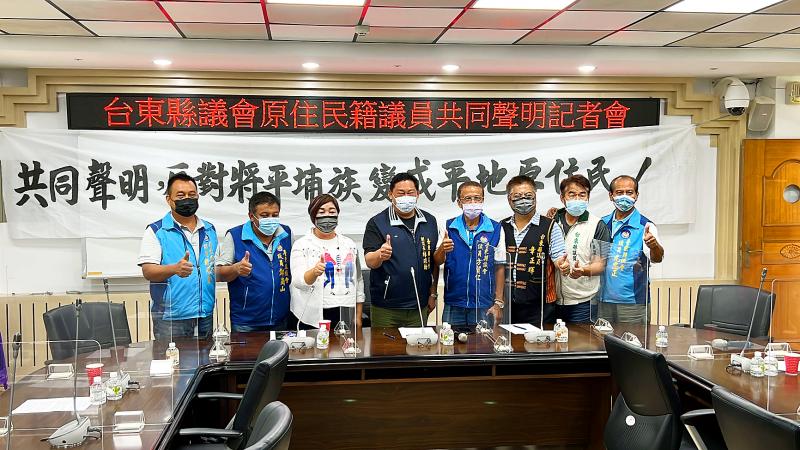Taitung County councilors have opposed the Siraya’s bid to be recognized as “indigenous peoples in plains areas,” as it might accelerate the Sinicization of indigenous people.
The Constitutional Court yesterday heard an oral argument for the case, whereby the Siraya, one of the Pingpu indigenous groups, requested to be recognized legally.
The Status Act for Indigenous Peoples (原住民身分法) does not recognize the Pingpu, who are unable to obtain indigenous status under the existing law.

Photo: CNA
Eight Amis, Paiwan and Puyuma councilors, as well as indigenous people from plains areas and mountainous areas, voiced their disapproval of the appeal in a joint statement issued yesterday.
Taitung County Council Deputy Speaker Lin Tsung-han (林琮翰) said that indigenous people were under legislative protection due to their unique culture, which would be obliterated if Pingpu groups that have already been Sinicized were hastily integrated into the existing categorizations of indigenous people.
The government should enact separate laws to recognize and protect Pingpu groups and establish a Pingpu Council to revive their culture, he said, citing the example of the Hakka Affairs Council.
Pingpu groups should not be included in the “indigenous peoples in plains areas” category, otherwise the lifestyles of existing indigenous peoples would be wiped out and “Taiwan’s indigenous people would soon disappear due to Sinicization,” he added.
Taitung County Councilor Lin Tsan-tien (林參天), who is Han Taiwanese, was highly supportive of recognizing the Pingpu as indigenous people, saying that historically they were “indigenous people’s brothers” so they should not be “left on the street.”
If indigenous people are worried that their resources would be diminished due to recognition of the Pingpu, the government could allocate a larger budget or increase the quota for legislators elected by indigenous peoples in plains areas instead of excluding the Pingpu, Lin Tsan-tien said.
Taking care of minority groups, such as passing the Indigenous Peoples Basic Act (原住民族基本法), can “bring harmony to Taiwan’s politics,” he said, adding that people in Taitung are working hard to improve the relationship between indigenous people and Han Taiwanese.
He called on indigenous people to “accept their brothers the Siraya.”

Taiwan is stepping up plans to create self-sufficient supply chains for combat drones and increase foreign orders from the US to counter China’s numerical superiority, a defense official said on Saturday. Commenting on condition of anonymity, the official said the nation’s armed forces are in agreement with US Admiral Samuel Paparo’s assessment that Taiwan’s military must be prepared to turn the nation’s waters into a “hellscape” for the Chinese People’s Liberation Army (PLA). Paparo, the commander of the US Indo-Pacific Command, reiterated the concept during a Congressional hearing in Washington on Wednesday. He first coined the term in a security conference last

Prosecutors today declined to say who was questioned regarding alleged forgery on petitions to recall Democratic Progressive Party (DPP) legislators, after Chinese-language media earlier reported that members of the Chinese Nationalist Party (KMT) Youth League were brought in for questioning. The Ministry of Justice Investigation Bureau confirmed that two people had been questioned, but did not disclose any further information about the ongoing investigation. KMT Youth League members Lee Hsiao-liang (李孝亮) and Liu Szu-yin (劉思吟) — who are leading the effort to recall DPP caucus chief executive Rosalia Wu (吳思瑤) and Legislator Wu Pei-yi (吳沛憶) — both posted on Facebook saying: “I

Sung Chien-liang (宋建樑), who led efforts to recall Democratic Progressive Party (DPP) Legislator Lee Kun-cheng (李坤城), was released on bail of NT$80,000 today amid outcry over his decision to wear a Nazi armband to questioning the night before. Sung arrived at the New Taipei District Prosecutors’ Office for questioning in a recall petition forgery case last night wearing a red armband bearing a swastika, carrying a copy of Adolf Hitler’s Mein Kampf and giving a Nazi salute. Sung left the building at 1:15am without the armband and covering the book with his coat. Lee said today that this is a serious

The Ministry of Economic Affairs has fined Taobao NT$1.2 million (US$36,912) for advertisements that exceed its approved business scope, requiring the Chinese e-commerce platform to make corrections in the first half of this year or its license may be revoked. Lawmakers have called for stricter enforcement of Chinese e-commerce platforms and measures to prevent China from laundering its goods through Taiwan in response to US President Donald Trump’s heavy tariffs on China. The Legislative Yuan’s Finance Committee met today to discuss policies to prevent China from dumping goods in Taiwan, inviting government agencies to report. Democratic Progressive Party Legislator Kuo Kuo-wen (郭國文) said